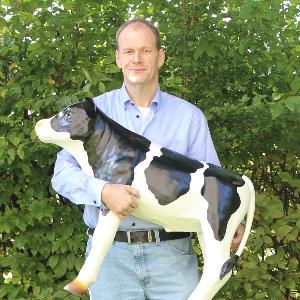Healthy herds through smart technology
26 Nov 2025
New LMU appointment Michael Iwersen combines high-tech with agricultural practice to promote animal health and welfare.
26 Nov 2025
New LMU appointment Michael Iwersen combines high-tech with agricultural practice to promote animal health and welfare.

Prof. Michael Iwersen with a model of a cow. | © privat
Michael Iwersen has a little Playmobil still-life in his office: a cart, and in front a farmer, a vet, a dog, and a cat. “I often take a picture of it into my lectures,” he says. “It illustrates what’s important to me: agriculture and veterinary medicine have to pull together.” In his research, the veterinarian and Professor of Herd Health Management at LMU combines scientific work with solid practical experience. His mission is to identify diseases and problems early in order to preserve and improve animal health and manage livestock as best as possible.
Growing up in Hamburg, Iwersen developed an enthusiasm for agriculture at an early age. He trained to become a farmer and then went on to study agricultural science. While still a student, he oversaw the conversion of a former publicly owned farm in Mecklenburg-Vorpommern into a modern farming operation. After his studies, he worked on this farm for several years as a herd manager. “During this period, we were able to significantly improve animal health and performance, and I saw with my own eyes how good management, along with improved feeding and housing conditions, can have a direct positive impact.”
At the same time, these experiences inspired him to study veterinary medicine at FU Berlin. Through research projects, he found his way into a scientific career and worked at the University of Veterinary Medicine in Vienna for 15 years. During his time there, he helped establish the university’s herd health management unit together with Prof. Marc Drillich and PD Dr. Daniela Klein-Jöbstl, before joining the Clinic for Ruminants here at LMU.
We have to adapt the technology to the animals and not vice-versa.Michael Iwersen
Practice and research are inseparable for Iwersen. “When it comes to livestock, farmers and vets have to act as partners. This requires trust and teamwork.” He views herd health management primarily as the preventive, holistic supervision of livestock farms. It is not just about the veterinary treatment of individual animals, but also about things like feeding and housing conditions. “We don’t just look at the individual animal, but at the overall system.” Animal welfare and efficiency are not trade-offs for Iwersen, rather the opposite: Good husbandry conditions and healthy animals are the foundation of commercial success. “We have to adapt the technology to the animals and not vice-versa.”
Modern technologies play a key role in Iwersen’s research. Using sensor-equipped ear-tags or collars – comparable to fitness trackers for humans – his team records movement and behavioral data such as time spent lying down, activity, eating, and rumination. “ We record up to 30 data points per animal per second. In this abundance of information, we search for specific patterns that provide insights into behavior, health, and wellbeing.” In addition, Iwersen and his team investigate how reliable and valid such systems are, and how they can be integrated into existing management systems to provide data-based support for decision-making at the farm level.
Another main research interest of Iwersen’s is the resistance of animals to diseases. This involves, for example, analyzing genetic traits, environmental conditions, and sensor data in combination to gain a better understanding of resilience and to develop predictive models for susceptibility to disease. “The goal is always to identify warning signs before an animal becomes visibly sick,” summarizes Iwersen.
The goal is always to identify warning signs before an animal becomes visibly sick.Michael Iwersen
With regard to teaching, Iwersen and his team, led by Dr. Corinna Hübner-Lausch and Dr. Rainer Martin, place a strong emphasis on direct practical experience and offer students the opportunity to visit farms and gain valuable hands-on experience. Among the herds, the future veterinarians can observe the full range of environmental and management factors that contribute to the occurrence or prevention of diseases. “We don’t expect any prior knowledge here,” Iwersen emphasizes. “Just curiosity and the willingness to pitch in and get involved.”
Iwersen appreciates the close connections between research and practice in Munich. “We’re currently overseeing around 60 farms and working closely with the farmers,” he says. He also values the positive collaboration between colleagues from the clinic, mobile care services, and herd health management– where, much like in his Playmobil still-life, everyone pulls together.